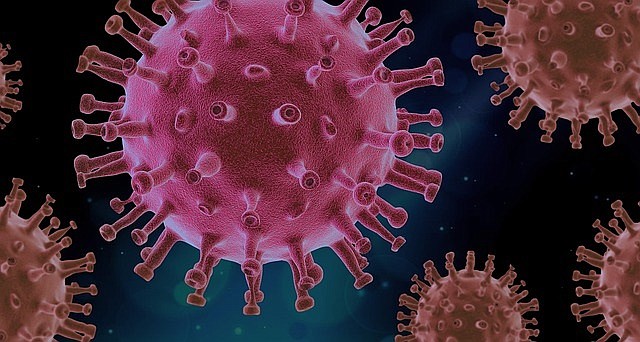Do I have Long-COVID?
Researchers have created an advanced model that can detect lung damage in long-COVID patients using a simple chest X-ray. The model takes data points from 3D CT lung scans and transfers them to be diagnosed by 2D chest X-ray equipment, which is more commonly available and less costly.
For patients dealing with lingering respiratory symptoms from COVID a chest X-ray can reveal only so much. The 2D scans simply can't distinguish compromised lung function. For that diagnosis, a more expensive, (3D) technique called a CT scan is necessary and many medical clinics in the United States don't have CT scanning equipment, leaving long-COVID patients with little information about their lung function.
That may change. Researchers at the University of Iowa have developed what is called a contrastive learning model. This model "learns" from composite 2D images constructed from 3D CT images to detect compromised lung function in long-COVID patients. Another technique, called transfer learning, then conveys lung diagnostic information from a CT scan to a chest X-ray, thus allowing chest X-ray equipment to detect abnormalities the same as if those patients had used a CT scan.
In the study, the researchers showed how their contrastive learning model could be applied to detect small airways disease, which is an early stage of compromised lung function in long-COVID patients. Among long-COVID patients, the models were advanced enough to distinguish the severity of the compromised lung function, separating those with small airways disease from those with more advanced respiratory issues.
"The new element to the model is taking information from 3D CT scans showing lung volume and transferring that information to a model that will show these same characteristics in 2D images," says Ching-Long Lin, who is the chair of the Department of Mechanical Engineering in the College of Engineering at Iowa. "Clinicians would be able to use chest X-rays to detect these outcomes. That's the bigger perspective."
The researchers based their modeling on CT scans of 100 people who were infected with the original COVID strain and had breathing problems between June and December 2020. Many of these long-COVID patients had small airways disease, which affects a network of more than 10,000 tubes at the nexus in the lung where oxygenated air mixes with blood to be carried throughout the body. People with small airways disease have many of these vessels constricted, thus limiting the oxygen-blood exchange in the lungs, and impeding breathing overall.
"Our models successfully identified decreased lung function from long-COVID patients compared to those who had not gotten the virus," said Lin. "Chest X-rays are accessible, while CT scans are more expensive and not as accessible. Our model can be further improved, and I believe there is potential for it to be used at all clinics without having to buy expensive imaging equipment, such as CT scanners."
How is Long-COVID Diagnosed and Treated?
Long-COVID, also called post-COVID conditions, is defined by the Centers for Disease Control and Prevention (CDC) as health problems lasting four or more weeks after first getting COVID-19. It is estimated that nearly one in five American adults who have had COVID-19 are impacted by some form of long-COVID.
Individuals suffering from long-COVID may experience a range of symptoms affecting the lungs, including trouble breathing, coughing and shortness of breath. Other symptoms patients have reported include memory or concentration issues, depression or anxiety, and even dizziness or joint pain.
Because long-COVID symptoms can affect several body systems, individual care should be tailored by a health care provider. Although there are no treatments yet approved specifically for long-COVID, health care providers may recommend certain treatments based on a patient’s specific symptoms.
There are many questions still unanswered about long-COVID. However, new and ongoing clinical trials are underway to test potential therapies for long-COVID symptoms. Currently, there are approximately 40 active clinical trials globally investigating long-COVID treatments, and approximately 1,300 global clinical trials underway exploring products to fight COVID-19.
Vaccinations and Immunity
Individuals previously infected with SARS-CoV-2, the virus that causes COVID-19, still benefit from vaccination, gaining 60% to 94% protection against reinfection, depending on the variant. During the recent pandemic, vaccination has been one of the best tools available for curbing the spread of COVID-19, according to a new study.
Individuals infected with the virus are known to develop long-lasting natural immunity, but researchers wanted to know whether these individuals would still benefit from receiving the vaccine. The team analyzed infection and vaccination data from nationwide Danish registers that included all people living in Denmark who tested positive for the virus or were vaccinated between January 2020 and January 2022.
The study included more than 200,000 individuals who tested positive for SARS-CoV-2 during each of the Alpha, Delta and Omicron waves. Their analysis showed that for people with previous infections, vaccination offered up to 71% protection against reinfection during the Alpha period, 94% during the Delta period and 60% during the Omicron period, with protection lasting up to nine months.
These findings show vaccination protected against SARS-CoV-2, over and above the protection offered by natural immunity during all three waves of variants. The authors point out that the current study was too short to determine whether the vaccine protects against severe outcomes, such as death and hospitalization, and that future studies with longer follow-up times will be necessary to answer this question.
John Schieszer is an award-winning national journalist and radio and podcast broadcaster of The Medical Minute. He can be reached at medicalminutes@gmail.com.





